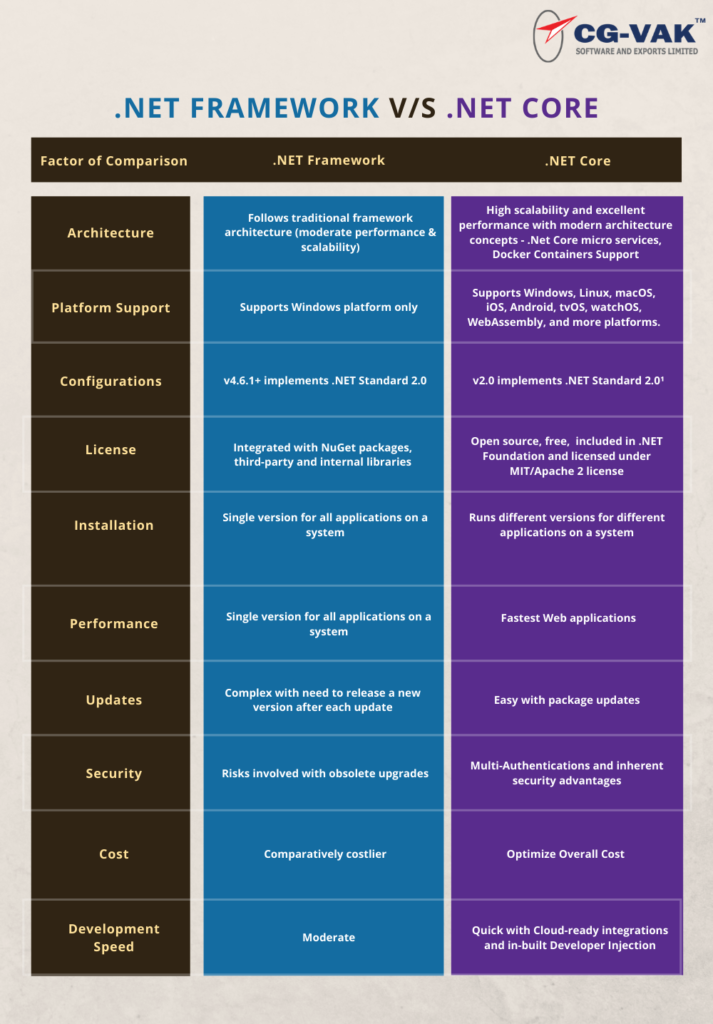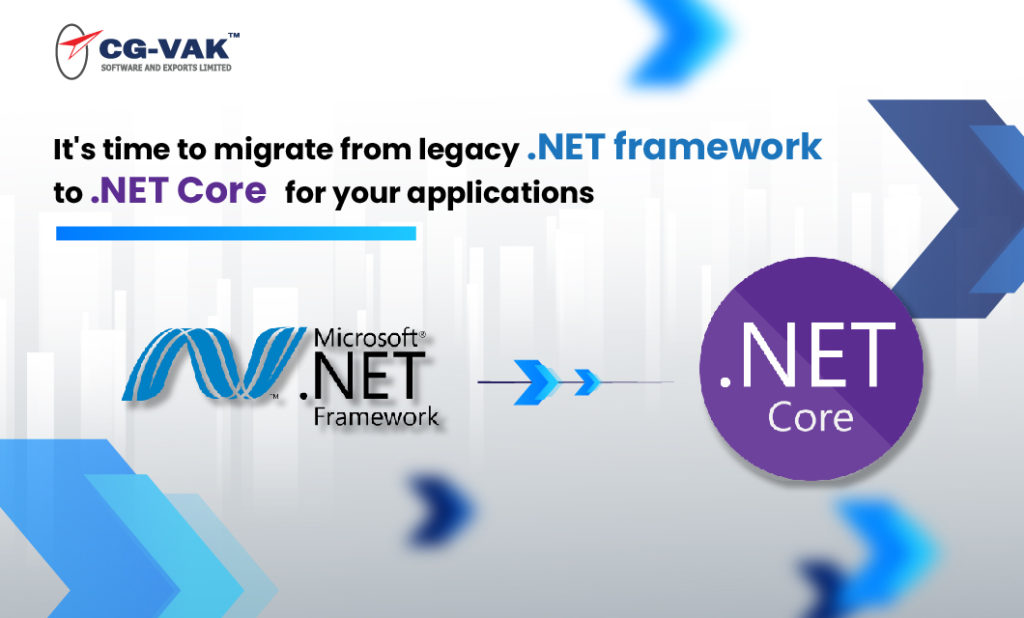Introduction of .NET Core framework by Microsoft in July 2019 for building interactive, mobile-friendly web applications, and early announcements of continuous upgrades each year from now is quite a thoughtful strategy. The standard IT organization has also planned to unify the current .NET Core 5.0 GA version to .NET with full compatibility to the legacy .NET web development framework from the next year (2021).
Do all these announcements point to migrating .NET to .NET Core? The current condition of the legacy .NET framework says it all. The .NET framework got is its last version update (4.8) in April 2019 and as announced by Microsoft, there shall be no major upgrade to it apart from security patches and bug fixing which means no additional feature and service updates. This is an undesirable situation for a .NET development company or those who outsource .NET development as innovations are limited now.
Why you should think about migrating from ASP.NET to ASP.NET Core?
ASP.NET is a useful component of the .NET framework to build dynamic websites and applications. But ASP.NET development is limited to the Windows platform only. As already announced by Microsoft, .NET is devoid of any further feature enhancement or addition, it would impact the performance of the custom application via ASP.NET development and also put security at risk.
While, if we consider ASP.NET Core, it is a complete package with robust services and integrations to build a customized application for multiple platforms including Windows. Moreover, the improvements and innovations assurance with regular updates to the new ASP.NET Core web application inspires many dedicated developers to migrate from ASP.NET to ASP.NET Core.
Are you ready to migrate? No need to be so quick for .NET Core migrations! We can take a break here and look at the definitive comparison here.
.NET framework V/s .NET Core
.NET Core is an improved extension of the legacy .NET framework and the dilution of the legacy .NET framework is planned in the coming year. Its service-oriented architecture is a bonus to the software developers to build flexible and high-performance software applications like never before. Both frameworks/platforms are used at almost the same ratio in the organizations today but many businesses are eager to migrate .NET to .NET Core due to its popularity and to eliminate the need for custom web application development and .NET development services.
Let us contemplate the exclusive advantages and robust features of the .NET Core over the .NET framework with a lucid comparison.

Migration of ASP.NET to ASP.NET Core
The comparison table depicts multiple business advantages with .NET Core over .NET development services developing interests in many web application developers to migrate from ASP.NET to ASP.NET Core. High-performance speed, user-friendly GUI, and high flexibility in ASP.NET Core web application are favorable aspects for them.
There is no direct ASP.NET to ASP.NET Core migration tool but we have prepared a constructive ASP.NET to ASP.NET Core migration strategy for all ASP.NET Core admirers. The prime requirement for this .NET to .NET Core migration is .NET Core SDK 2.2 or later.
1. Framework retargeting
With ASP.NET Core projects, you can target .NET Core, .NET framework, or both. Select your choice.
Tip: If you target .NET Core, you can remove explicit package references using ASP.NET Core meta package and its precompiled Runtime Store can be used for improved performance.
2. Create New ASP.NET Core Project
Simplify the project by eliminating XML merge conflicts and create a new project in the .csproj file format.
Tip: Edit project file using Visual Studio in ASP.NET Core web server as it facilitates file readability without any GUID based references to other projects.
3. App Bootstrapping
Perform route configuration, add filters, and area registrations using the entry point and configure the pipeline.
Tip: Use .NET Core improved bootstrapping mechanism which includes Startup as the entry point that helps in decoupling application and server to avoid issues in the implementation process.
4. Implement Store Configurations
Use appsettings.jason project template to store configurations for deciding platform environment with strongly typed set of configuration objects.
Tip: Use the extension to configuration service known a Dependency Injection, an advanced part of .NET Core web server software architecture for large, scalable applications.
5. Follow Partial-App Migration
Divide ASP.NET applications by creating an IIS-sub application and using the URL structure of the application, move only certain routes from source to destination.
Tip: Use small modules and projects for quick and efficient .NET migrations to .NET Core while moving microservices.
6. Manage Over posting
Use Bind and Input Formatters attribute to avoid the overposting scenario.
Tip: Replace Bind attribute with same properties view model while using JSON Input formatters and JSON info controllers for parsing the data.
Consider the above standard reference steps carefully for migrating ASP.NET apps to ASP.NET Core platform efficiently. These are also applicable for migrating ASP.NET MVC to ASP.NET Core MVC when planning for MVC web development.
There is another approach, i.e. rewriting with porting. It is a cost-effective migration strategy useful for a large domain organization. It includes conversion of single domain functionality into microservice and porting it into .NET Core microservices one by one while using the existing code and the above ASP.NET to ASP.NET Core migration strategy.
Choose all resources including ASP.NET to ASP.NET core migration tool wisely and work under expert guidance always.
.NET Core: Is it the future for apps?
The smart, dynamic extension of the traditional .NET Framework, .NET Core holds various positive points in comparison. An ASP.NET Core Web application is highly scalable, interactive with enhanced performance owing to integrated software architecture like Docker Containers integration and .NET Core microservice. The advantages of Cross-platform support and provision to use multiple services on the same server on different .NET versions tend many developers to think for .NET Core migrations.
Still, the .NET Core framework includes minor flaws as it is not completely adapted to all of the .NET web development technologies, does not support 3rd party .NET libraries, and has limited or no access to Windows specific APIs..
But, Microsoft has already seen a future in .NET Core by promising new versions and continuous open-source projects along with a planned unification of the .NET framework and .NET Core. This negates the current limitations in the .NET Core framework and brings to migrate .NET to .NET Core.
Also, the exclusive support of .NET Core to the most popular programming language C# which makes it a candidate for an alternative to JAVA is the prominent attraction for any .NET application development company for migrating from ASP.NET MVC to ASP.NET Core MVC under the MVC web development category.
So, it would not be wrong to mention that the revolutionary .NET Core framework is the absolute future of robust and cost-effective web applications.
Get ready to migrate your .NET framework Legacy apps to .NET Core now!
Now, that we have contemplated both .NET and .NET Core frameworks features and aspects till now, the decision for migrating ASP.NET apps to ASP.NET Core is easier.
Are you preparing for .NET to .NET Core migration or on the path of migrating from ASP.NET MVC to ASP.NET Core MVC? Then we recommend you to visit CG-VAK and get smart consultation services from the dedicated IT professionals and experts. We are a reputed offshore IT services and solutions provider aimed to outsource excellent technology innovation solutions. You can send your queries and requirements via mailing and get connected directly.
Summary
.NET Core framework features are superior to legacy .NET framework for building flexible, user-friendly web applications. Microsoft got this idea in advance and is now interested in the further development of this framework. Relying on the trust in the standard IT organization and alluring with the advantageous attributes of the .NET Core framework, many IT organizations are routing towards it at a great speed.
